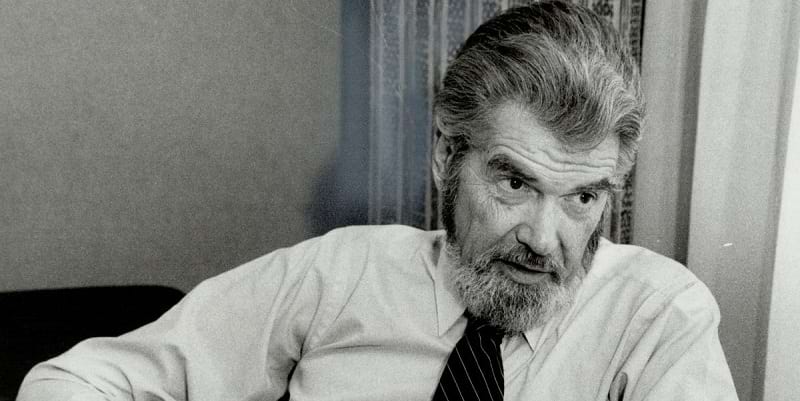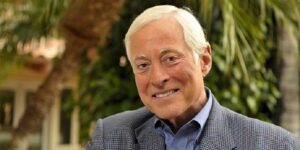Laurence J. Peter biografie en quotes

Laurence J. Peter (16 september 1919 – 12 januari 1990) was een Amerikaanse onderwijskundige en auteur. Hij is bekend geworden dankzij zijn boek ‘The Peter Principle: Why Things Always Go Wrong’, uit 1969. In dit boek legt hij het Peter Principe uit: de suggestie dat werknemers promotie krijgen dankzij successen uit hun vorige functies, waardoor ze uiteindelijk in een rol terechtkomen waarvoor ze niet geschikt zijn.
Laurence J. Peter was ook professor aan de University of Southern California, en schreef verschillende andere boeken, waaronder The Peter Prescription, The Peter Plan en The Peter Pyramid. Hij werkte ook als consultant en publieke spreker, met name op het gebied van managementeducatie. Hij geloofde dat het traditionele onderwijssysteem teveel nadruk legde op het onthouden van informatie en testen, in plaats van het ontwikkelen van creativiteit en vaardigheden voor kritisch denken.
De biografie van Laurence J. Peter
Laurence J. Peter werd geboren in Vancouver, British Columbia, Canada. Zijn vader was William Peter en zijn moeder Margaret Peter. Zijn beide ouders waren Schotse immigranten die zich in Canada hadden gevestigd. Toen Peter drie jaar oud was, verhuisde het gezin naar Californië. Hier groeide hij op in de stad Beverly Hills.
Als kind had Laurence J. Peter vooral interesse in sport. Hij speelde vooral voetbal, basketbal en honkbal gedurende zijn tijd op de middelbare school. Ook was hij lid van het debatteam en schreef hij voor de schoolkrant. Hij behaalde zijn diploma aan Beverly Hills High School in 1936 en schreef zich vervolgens in aan de University of Southern California.
Tijdens zijn tijd aan USC was Peter lid van de Delta Chi-broederschap en speelde hij in het football-team. Hij behaalde zijn bachelorsdiploma in onderwijs in 1941 en ging daarna lesgeven op een middelbare school in Californië.
Nadat de Verenigde Staten betrokken raakte bij de Tweede Wereldoorlog, trad Peter toe tot de United States Navy. Hier diende hij als luitenant. Hij werd toegewezen aan de USS Marblehead, een kruiser die betrokken was bij verschillende grote veldslagen in de Stille Oceaan.
Peter stopte in 1946 bij het leger en keerde terug naar Californië, waar hij zijn loopbaan als docent voortzette. Hij behaalde vervolgens zijn master- en doctoraatsdiploma in onderwijs aan de University of California, Los Angeles.
Laurence J. Peter ’s ervaringen als student en docent waren van grote invloed op zijn latere werk op het gebied van organisatietheorie en management.
Hij raakte geïnteresseerd in het begrijpen waarom sommige organisaties effectiever waren dan andere en hoe de prestaties van organisaties verbeterd konden worden. Deze interesse leidde hem tot het schrijven van “Het Peter Principe”. Dit deed hij samen met Raymond Hull. Het boek werd een baanbrekend boek op het gebied van managementtheorie.
Latere leven van Laurence J. Peter
Na deze succesvolle publicatie van “The Peter Principle” in 1969, ging hij door met het schrijven van boeken, met name over organisatietheorie en management. Enkele boeken zijn “The Peter Prescription: How to Make Things Go Right”, “The Peter Plan: A Proposal for Survival”, en “The Peter Pyramid: Further Applications of the Principle”.
Laurence J. Peter werd ook een veelgevraagde spreker en adviseur op het gebied van management en organisatietheorie en reisde naar verschillende landen om lezingen te geven en advies te geven aan bedrijven en organisaties.
Peter bleef zijn hele leven lesgeven en was hoogleraar onderwijs aan de Universiteit van Zuid-Californië tot aan zijn pensionering. Na zijn pensionering bleef hij nauw betrokken bij het onderwijs in het algemeen en gaf hij les aan verschillende andere universiteiten en instituten.
Peter overleed aan een hartaanval op 12 januari 1990 in Palos Verdes Estates, Californië. Hij werd 70 jaar oud. Zijn werk heeft een blijvende invloed gehad op de studie van organisatietheorie en management en blijft relevant voor managers en organisaties over de hele wereld.
Bekende quotes
- “A man convinced against his will is not convinced.”
- “A pessimist is a man who looks both ways when he crosses the street.”
- “A teacher who is attempting to teach without inspiring the pupil with a desire to learn is hammering on cold iron.”
- “Against logic, there is no armor like ignorance.”
- “An economist is an expert who will know tomorrow why the things he predicted yesterday didn’t happen today.”
- “An expert is someone who knows more and more about less and less until he knows absolutely everything about nothing.”
- “An intelligence test sometimes shows a man how smart he would have been not to have taken it.”
- “Bureaucracy defends the status quo long past the time when the quo has lost its status.”
- “Committees have become so important nowadays that subcommittees have to be appointed to do the work.”
- “Competence, like truth, beauty, and contact lenses, is in the eye of the beholder.”
- “Democracy is a process by which people are free to choose the man who will get the blame.”
- “Don’t believe in miracles – depend on them.”
- “Don’t let your mind wander – it’s too small to be out by itself.”
- “Education is a method whereby one acquires a higher grade of prejudices.”
- “Everyone rises to their level of incompetence – even in love.”
- “Facts are stubborn, but statistics are more pliable.”
- “If a cluttered desk is a sign of a cluttered mind, of what, then, is an empty desk a sign?”
- “If at first you don’t succeed, failure may be your style.”
- “If you don’t know where you’re going, you will probably end up somewhere else.”
- “In a hierarchy, every employee tends to rise to his level of incompetence.”
- “Man is a rational animal who always loses his temper when he is called upon to act in accordance with the dictates of reason.”
- “Originality is the fine art of remembering what you hear but forgetting where you heard it.”
- “Some people manage by the book, even though they don’t know who wrote the book or even what book.”
- “Some problems are so complex that you have to be highly intelligent and well-informed just to be undecided about them.”
- “Speak up and the world will be grateful; be silent and the world will ignore you.”
- “Speak when you are angry and you will make the best speech you will ever regret.”
- “Television has changed the American child from an irresistible force to an immovable object.”
- “The best defense against logic is ignorance.”
- “The best way to appreciate your job is to imagine yourself without one.”
- “The best way to get a good idea is to get a lot of ideas.”
- “The function of the expert is not to be more right than other people, but to be wrong for more sophisticated reasons.”
- “The great question is not whether you have failed, but whether you are content with failure.”
- “The man who is always waving the flag usually waives what it stands for.”
- “The man who says he is willing to meet you halfway is usually a poor judge of distance.”
- “The most valuable function performed by the federal government is entertainment.”
- “The noblest of all dogs is the hot-dog; it feeds the hand that bites it.”
- “The problem with troubleshooting is that trouble shoots back.”
- “The reason why worry kills more people than work is that more people worry than work.”
- “The seaman tells stories of winds, the ploughman of bulls; the soldier details his wounds, the shepherd his sheep.”
- “The trouble with the rat race is that even if you win, you’re still a rat.”
- “There are two kinds of failures: those who thought and never did, and those who did and never thought.”
- “There’s nothing wrong with being incompetent – it’s just that it’s hard to get people to take you seriously.”
- “We are all born ignorant, but one must work hard to remain stupid.”
- “You can’t study the darkness by flooding it with light.”
Boeken en publicaties van Laurence J. Peter et al.
- 1996. The Peter Principle: In Action Again. HarperCollins Publishers.
- 1994. The Peter Plan II: The Next Step in the Peter Principle. HarperCollins Publishers.
- 1992. Peter’s People: A Study in Leadership. HarperCollins Publishers.
- 1991. The Peter Principle: A Classic in Management Theory. HarperCollins Publishers.
- 1990. The Peter Pyramid: Tracking the Self-Fulfilling Prophecy. William Morrow and Company, Inc.
- 1987. The Peter Prescription for a Healthy Back. William Morrow and Company, Inc.
- 1985. The Peter Fables: An Introduction to Peter Philosophy. William Morrow and Company, Inc.
- 1983. Peter’s Quotations: Ideas for Our Times. William Morrow and Company, Inc.
- 1979. The peter pyramid: Further applications of the principle. William Morrow and Company, Inc.
- 1976. Why some societies are better than others. New York: William Morrow.
- 1974. The Peter principle revisited: A retrospective of the Peter principle. William Morrow and Company, Inc.
- 1973. The Peter Pyramid: Or, Will We Ever Get the Point? William Morrow and Company, Inc.
- 1972. The Peter Plan: A proposal for survival. William Morrow and Company, Inc.
- 1970. The Peter Prescription: How to make things go right. William Morrow and Company, Inc.
- 1969. The Peter Principle: Why things always go wrong. Harper & Row Publishers.
Citatie voor dit artikel:
Janse, B. (2023). Laurence J. Peter. Retrieved [insert date] from Toolshero: https://www.toolshero.nl/bekende-auteurs/laurence-j-peter/
Originele publicatiedatum: 10/05/2023 | Laatste update: 11/05/2023
Wilt u linken naar dit artikel, dat kan!
<a https://www.toolshero.nl/bekende-auteurs/laurence-j-peter/”>Toolshero: Laurence J. Peter</a>











